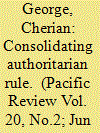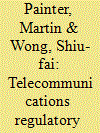|
|
|
Sort Order |
|
|
|
Items / Page
|
|
|
|
|
|
|
| Srl | Item |
| 1 |
ID:
077759


|
|
|
| 2 |
ID:
077755


|
|
|
|
|
| Publication |
2007.
|
| Summary/Abstract |
Despite the persistence of authoritarian forms of rule, studies of state domination have seen little need to analyse the use of force against citizens. This essay argues that, while state violence is elemental, it is not straightforward. States have a range of repressive tools at their disposal, which they need to deploy rationally and with finesse if they are to consolidate their authoritarian systems. As a step towards problematizing state violence, this essay suggests the concept of calibrated coercion, which represses challengers with minimum political cost. Calibrated coercion is illustrated through an in-depth case study of press controls in Singapore, where one of the world's most successful hegemonic parties has governed continuously for four decades. Behind the stability of the press system, the Singapore government has made fundamental changes to its modes of control, with less frequent recourse to blunter instruments such as newspaper closures or arbitrary arrest. Instead, less visible instruments are increasingly used, with the media's commercial foundations turned against themselves
|
|
|
|
|
|
|
|
|
|
|
|
|
|
|
|
| 3 |
ID:
077756


|
|
|
|
|
| Publication |
2007.
|
| Summary/Abstract |
The 1979 UN Convention on the Elimination of all Forms of Discrimination against Women highlights the importance of equal participation of women in public life. Since the early 1960s, women in Japan have voted in elections at significantly higher rates than men. However, Japanese women's equal participation in policy formulation and decision making lags far behind major democracies. Gender equality is stated under the Japanese Constitution, but social practices are far from equal. There are no legal constraints on Japanese women's right to candidacy for public office, but they are far underrepresented in local and national elected assemblies. In 1999 an important landmark in the substantial progress towards gender equality took place when the Japanese government, for the first time, legally denounced the stereotyped division of roles on the basis of gender and described men and women as equal partners. An unprecedented amount of legislation, together with policy changes and organizational reform at the national level were introduced from this state-led initiation. In the same year, women's grassroots groups were rapidly moving beyond the reach of policy, organizational, and legal changes; they successfully conducted a major nationwide campaign for 'More Women to Assemblies¡' and increased the number of elected women representatives at the local level at an unprecedented rate. The purpose of this article is to assess the potential of increased women's political voices in Japan, which can be seen as an alternative way of solving the problems of political disengagement in the male-dominated representative democracy. To this end, the article examines the course of watershed events in 1999 towards a gender-equal society in Japan, with special emphasis on the importance of grassroots missions in eliminating barriers to Japanese women's political participation
|
|
|
|
|
|
|
|
|
|
|
|
|
|
|
|
| 4 |
ID:
077758


|
|
|
| 5 |
ID:
077757


|
|
|
|
|
| Publication |
2007.
|
| Summary/Abstract |
Successful economic liberalization somewhat paradoxically requires high levels of state capacity, while 'deregulated' markets deploy new regulatory mechanisms that, rather than diminishing state power, reconfigure it. A comparative case study into the recent liberalization reforms of the telecommunications sectors of Hong Kong and Singapore is presented here in order to throw light on these developments. The end result of the reform processes in each jurisdiction is quite similar - globally open, competitive and highly efficient telecommunications markets in which major global companies are leading players. However, the routes by which this end result was achieved tell different stories about the manner in which governments balance domestic interests in the process of liberalization. They build on local institutional strengths and deploy instruments appropriate to their own bureaucratic and political contexts. Correspondingly, in constructing the 'new regulatory state', they produce subtle variations on the pro-competitive model of regulation. However, detailed analysis of the two reformed telecommunications regimes shows that underlying these differences is the prominence of a common set of instruments that make less use of highly intrusive, direct forms of state power but greater use of more indirect forms that thrive 'in the shadow' of state authority, a phenomenon that is at the heart of theorizing about the new regulatory state. These instruments enhance rather than diminish state capacity where they are deployed strategically by governments
|
|
|
|
|
|
|
|
|
|
|
|
|
|
|
|
|
|
|
|
|